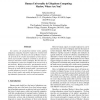Free Online Productivity Tools
i2Speak
i2Symbol
i2OCR
iTex2Img
iWeb2Print
iWeb2Shot
i2Type
iPdf2Split
iPdf2Merge
i2Bopomofo
i2Arabic
i2Style
i2Image
i2PDF
iLatex2Rtf
Sci2ools
EUC
2008
Springer
2008
Springer
Human Universality in Ubiquitous Computing: Maslow, Where Are You?
Too narrow, the productivity-oriented vision guiding ubiquitous computing should be replaced or enriched with humanistic aspects. We discuss the role of Maslow's hierarchy of needs in the creation and adoption of smart spaces, robots and wearable computers worldwide to provide elements for alternative visions of ubiquity. We show that current ubiquitous systems are stratified at the lowest levels of the hierarchy. Based on interviews, questionnaires and experiments, we highlight a positive correlation between the hierarchy of needs and the general public's perception and possible adoption of services. Finally, we discuss implications of these results, and notably the importance of creating humanistic frameworks, services and environments.
Applied Computing | Current Ubiquitous Systems | EUC 2008 | Maslow's Hierarchy | Ubiquitous Computing |
| Added | 19 Oct 2010 |
| Updated | 19 Oct 2010 |
| Type | Conference |
| Year | 2008 |
| Where | EUC |
| Authors | Sébastien Duval, Christian Hoareau, Hiromichi Hashizume |
Comments (0)

